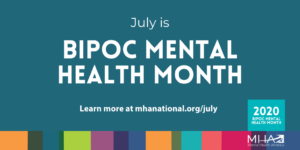
July is BIPOC Month
(Black, Indigenous, Persons of Color)
What is BIPOC? By including “BI” Black and Indigenous in addition to “POC” people of color, we are honoring the unique experiences of Black and Indigenous individuals and their communities, as well as the spectrum of existence and experience by POC. This July, MHA has developed content that is both timely and hopefully evergreen. We have included many of these resources here.
a.k.a. Bebe Moore Campbell National Minority Mental Health Awareness Month
Formally recognized in June 2008, Bebe Moore Campbell National Minority Mental Health Awareness Month has been observed each July and was created to bring awareness to the unique struggles that underrepresented groups face regarding mental illness in the United States.
Bebe Moore Campbell was an American author, journalist, teacher, and mental health advocate who worked tirelessly to shed light on the mental health needs of the Black community and other underrepresented communities.
Mental Health America (MHA) has honored Ms. Campbell’s memory each year by dedicating a mental health toolkit in July to the mental health needs of traditionally underserved and underrepresented populations. In our work, we have tried both to elevate voices in these communities and to improve understanding of the mental
health challenges they face.
In recent weeks, our country has awakened to the longstanding effects of racism and bigotry, including the effects on mental health. This includes the racism and bigotry that have been built into systems of care, services, and supports that often went unchecked and unmentioned.
That systemic racism and bigotry have had terrible consequences for so many people. As the Brookings Center has reported, Black, Indigenous, and Latinx people in the United States have all experienced higher infection and death rates from COVID-19. At Mental Health America of Putnam County (MHAoPC), we have also documented greater mental health impacts on people who identify as Asian or Pacific Islander or of mixed race. The same has been true for a long time for people who identify as LGBTQ+
People and language evolve, and Mental Health America of Putnam County (MHAoPC) has chosen to remove the word “minority” from our toolkit and will be phasing it out on our materials. Instead, we are using a different designation – BIPOC – that we believe more fairly honors and distinguishes the experiences of Blacks, Indigenous People, and People of Color.
#IMPACTOFTRAUMA
People can carry trauma throughout generations due to historical adversities, violence, and oppression. Sometimes, our daily lives are influenced by trauma that we aren’t even aware of. Trauma is a deeply distressing or disturbing experience, and those who identify as BIPOC – especially queer and trans people – can often recount tales of actions, words, and events that have made a deep impact on the way they live, speak, and think. For us to understand the impacts of trauma, we have to use an intersectional lens that helps us look beyond one experience, but think about historical factors, systems and more that influence our thinking and emotional wellbeing. If you would like to read about racial trauma, check out our racial trauma page.
Online Resources
Mental Health America of Putnam County (MHAoPC) is delighted to dedicate the following number of resources and studies for our community members’ well being on our website.We welcome you to use and share this information in whatever way best suits your needs.
- Racism and Mental Health
- Black and African American Communities
- Latinx/Hispanic Communities
- Asian American/Pacific Islander Communities
- Native and Indigenous Communities
- LGBTQ+ Communities
#Tools2Thrive
In 2020, Mental Health America of Putnam County (MHAoPC) is proud to share and explore topics that can help you build your own set of #Tools2Thrive. These areas include: recognizing and owning your feelings; connecting with others; finding the positive after loss; eliminating toxic influences; creating healthy routines; and supporting others – all as ways to boost the mental health and general wellness of you and your loved ones. We are adding to this section daily to deliver timely resources for all these subjects. We’re so happy to be able to share these!
MHA – Nationally Recognized Screenings
Writing of screenings, we invite you take a quick snapshot of your mental health with one of many available. One of the easiest tools anyone can use is taking a mental health screen when they need answers. It’s a quick, free, and private way for people to assess their mental health and recognize signs of mental health problems. Screenings not only help you think about specific challenges, they can help you define specific issues and help others (e.g. surveys for Caregivers, Parents, and Better Care for Adults). You can reach the screenings at mhascreening.org.
Practical tools are close by that everyone can use to improve their mental health and increase resiliency regardless of the situations they are dealing with. Don’t hesitate to reach out and research, evaluate, and engage. Remember, we’re all in this together, and our strength is working with each other.
For more information, visit all our BIPOC Mental Health Month pages, by calling 765-653-3310, or texting 765-246-1003.
